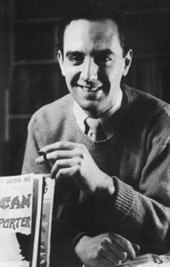Sandy Wilson |
By 1932, he was attending Elstree Preparatory School, which he found unbearably militaristic. The one advantage was that it enabled him to have outings to London. The West End became for him the very focus of enchantment with shows such as Cole Porter's Anything Goes (1934) and Ivor Novello's Glamorous Night (1935). In 1937, he entered Harrow School, where he organised his own production of Medea and was taught piano by Henry Havergal. In 1942, he won a classical scholarship to Oriel College, Oxford, but the war intervened and he found himself in Egypt working as an army clerk. Oxford and the revueWilson finally entered Oxford in 1946, where he joined the famous Oxford University Dramatic Society along with such fellow budding artistes as Kenneth Tynan, Donald Swann and John Schlesinger. The most popular form with the society was the revue — a pot-pourri of satirical sketches, song and dance. Wilson wrote a sketch with music for a society revue called High. Broad and Corny, on the strength of which he was invited to contribute to two revues which appeared at the Lyric in Hammersmith, London. For Oranges And Lemons (1948) he created an episode about an insomniac sheep, and the same year, in Slings And Arrows, he wrote a satire on the absurd Rank Charm School, which taught etiquette to young starlets. In 1950, Wilson contributed to his first real musical, a forgotten piece of fluff entitled Caprice, concerning riotous adventures on the Riviera. A year later. he contributed a sketch to the revue See You Later, about an actress tired with having wet slippers due to men drinking champagne out of them. Underneath the arches Wilson's once-in-a-lifetime opportunity came about in 1953 when the
Players' Theatre in London offered him the chance to write a musical.
At around an hour long, The Boy Friend proved such an overnight success
that it reopened, in an expanded form, at London's Wyndham's Theatre,
playing for a stunning 2,084 performances.
|
 Sandy Wilson was horn in the period of his most popular musical creation.
His father, George Wilson, spent many years in India, where he worked
in shipping. He met his wife there and Sandy was born upon their return
to Sale, Greater Manchester, in 1924. As a child, he would dance and
sing to records of Vincent Youmans'
Sandy Wilson was horn in the period of his most popular musical creation.
His father, George Wilson, spent many years in India, where he worked
in shipping. He met his wife there and Sandy was born upon their return
to Sale, Greater Manchester, in 1924. As a child, he would dance and
sing to records of Vincent Youmans'